基础成人口语教学三
成人趣味口语教案模板范文
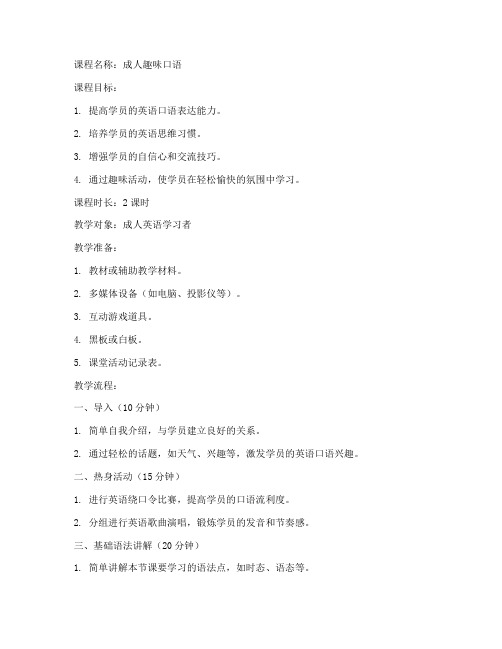
课程名称:成人趣味口语课程目标:1. 提高学员的英语口语表达能力。
2. 培养学员的英语思维习惯。
3. 增强学员的自信心和交流技巧。
4. 通过趣味活动,使学员在轻松愉快的氛围中学习。
课程时长:2课时教学对象:成人英语学习者教学准备:1. 教材或辅助教学材料。
2. 多媒体设备(如电脑、投影仪等)。
3. 互动游戏道具。
4. 黑板或白板。
5. 课堂活动记录表。
教学流程:一、导入(10分钟)1. 简单自我介绍,与学员建立良好的关系。
2. 通过轻松的话题,如天气、兴趣等,激发学员的英语口语兴趣。
二、热身活动(15分钟)1. 进行英语绕口令比赛,提高学员的口语流利度。
2. 分组进行英语歌曲演唱,锻炼学员的发音和节奏感。
三、基础语法讲解(20分钟)1. 简单讲解本节课要学习的语法点,如时态、语态等。
2. 通过例句和实际对话,使学员更好地理解语法点。
四、趣味口语活动(40分钟)1. 角色扮演:学员分组,根据教材内容进行角色扮演,锻炼口语表达能力。
2. 词语接龙:学员轮流说出一个单词,下一个学员需要说出一个与上一个单词拼音或词义相关的单词,以此类推,锻炼学员的词汇量和反应速度。
3. 猜谜游戏:老师出一个英语谜语,学员猜测答案,锻炼学员的听力理解和思维能力。
五、总结与反思(10分钟)1. 对本节课所学内容进行总结,强调重点语法点和口语技巧。
2. 学员分享学习心得,互相鼓励,共同进步。
教学评价:1. 观察学员在课堂上的参与度和积极性。
2. 评价学员的口语表达能力和语法掌握程度。
3. 收集学员的课堂活动记录表,了解学员的学习效果。
课后作业:1. 复习本节课所学语法点。
2. 预习下一节课的内容。
3. 每天进行英语口语练习,如背诵英语短文、观看英语视频等。
备注:1. 教师应根据学员的实际情况,调整教学内容和难度。
2. 鼓励学员积极参与课堂活动,营造轻松愉快的课堂氛围。
3. 定期进行学员的口语测试,评估学习效果。
口语教学步骤
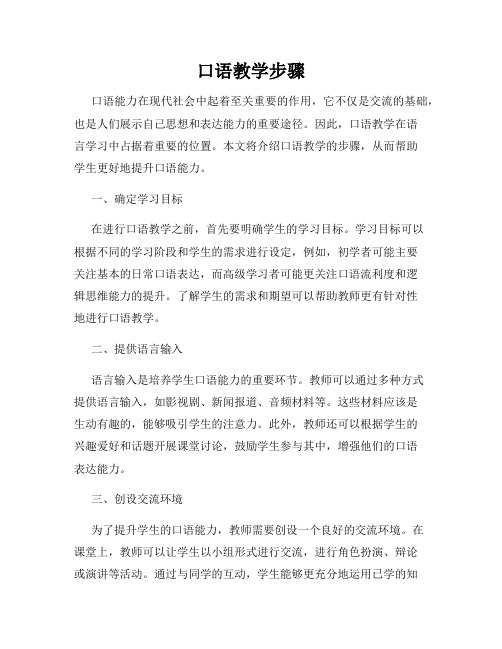
口语教学步骤口语能力在现代社会中起着至关重要的作用,它不仅是交流的基础,也是人们展示自己思想和表达能力的重要途径。
因此,口语教学在语言学习中占据着重要的位置。
本文将介绍口语教学的步骤,从而帮助学生更好地提升口语能力。
一、确定学习目标在进行口语教学之前,首先要明确学生的学习目标。
学习目标可以根据不同的学习阶段和学生的需求进行设定,例如,初学者可能主要关注基本的日常口语表达,而高级学习者可能更关注口语流利度和逻辑思维能力的提升。
了解学生的需求和期望可以帮助教师更有针对性地进行口语教学。
二、提供语言输入语言输入是培养学生口语能力的重要环节。
教师可以通过多种方式提供语言输入,如影视剧、新闻报道、音频材料等。
这些材料应该是生动有趣的,能够吸引学生的注意力。
此外,教师还可以根据学生的兴趣爱好和话题开展课堂讨论,鼓励学生参与其中,增强他们的口语表达能力。
三、创设交流环境为了提升学生的口语能力,教师需要创设一个良好的交流环境。
在课堂上,教师可以让学生以小组形式进行交流,进行角色扮演、辩论或演讲等活动。
通过与同学的互动,学生能够更充分地运用已学的知识,并且在实践中提升口语表达能力。
此外,教师还可以借助互联网和技术手段,引入在线讨论平台或语音交流工具,进一步拓展交流的范围。
四、提供反馈和指导口语教学离不开及时的反馈和指导。
教师对学生的口语表达进行评估,并给予具体的建议和指导,帮助学生发现问题并加以改进。
教师可以针对学生的发音、语法、词汇使用等方面进行评估,同时鼓励学生积极参与课堂活动,勇于表达自己的观点。
这样的反馈和指导有助于学生不断地提高口语能力。
五、练习口语技巧为了加强学生的口语能力,教师还可以组织学生进行口语技巧的练习。
口语技巧包括语调、语速、流利度和表达清晰等方面。
教师可以通过模仿练习、情景对话和口语游戏等形式,帮助学生掌握各种口语技巧。
此外,教师还可以布置口语任务,要求学生在限定的时间内完成口语练习,提高口语应对能力。
成人口语课教案模板范文
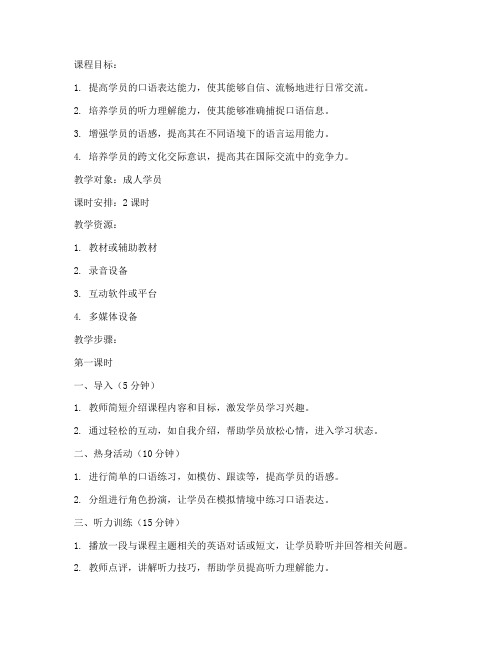
课程目标:1. 提高学员的口语表达能力,使其能够自信、流畅地进行日常交流。
2. 培养学员的听力理解能力,使其能够准确捕捉口语信息。
3. 增强学员的语感,提高其在不同语境下的语言运用能力。
4. 培养学员的跨文化交际意识,提高其在国际交流中的竞争力。
教学对象:成人学员课时安排:2课时教学资源:1. 教材或辅助教材2. 录音设备3. 互动软件或平台4. 多媒体设备教学步骤:第一课时一、导入(5分钟)1. 教师简短介绍课程内容和目标,激发学员学习兴趣。
2. 通过轻松的互动,如自我介绍,帮助学员放松心情,进入学习状态。
二、热身活动(10分钟)1. 进行简单的口语练习,如模仿、跟读等,提高学员的语感。
2. 分组进行角色扮演,让学员在模拟情境中练习口语表达。
三、听力训练(15分钟)1. 播放一段与课程主题相关的英语对话或短文,让学员聆听并回答相关问题。
2. 教师点评,讲解听力技巧,帮助学员提高听力理解能力。
四、口语表达练习(20分钟)1. 教师给出一个口语表达主题,如“我的工作经历”,让学员进行口语练习。
2. 学员分组进行讨论,互相纠正发音和语法错误,提高口语表达能力。
五、小组展示(10分钟)1. 各小组展示自己的口语练习成果,其他学员给予评价和反馈。
2. 教师点评,总结本节课的学习重点。
第二课时一、复习与巩固(5分钟)1. 回顾上节课的学习内容,巩固所学知识。
2. 进行简单的口语练习,检查学员的学习效果。
二、口语实战演练(20分钟)1. 教师设置一个真实场景,如餐厅点餐、购物等,让学员进行口语实战演练。
2. 学员分组进行角色扮演,提高在实际情境中的口语运用能力。
三、语法讲解与练习(15分钟)1. 教师针对上节课学员在口语表达中出现的语法错误进行讲解。
2. 学员进行语法练习,巩固所学语法知识。
四、互动游戏(10分钟)1. 教师组织一个互动游戏,如“你说我猜”,让学员在游戏中提高口语表达能力。
2. 教师点评,总结本节课的学习重点。
成人英语口语备课教案模板范文
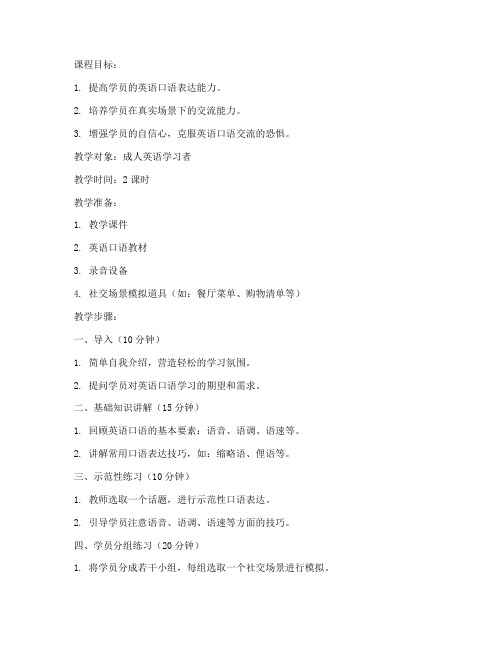
课程目标:1. 提高学员的英语口语表达能力。
2. 培养学员在真实场景下的交流能力。
3. 增强学员的自信心,克服英语口语交流的恐惧。
教学对象:成人英语学习者教学时间:2课时教学准备:1. 教学课件2. 英语口语教材3. 录音设备4. 社交场景模拟道具(如:餐厅菜单、购物清单等)教学步骤:一、导入(10分钟)1. 简单自我介绍,营造轻松的学习氛围。
2. 提问学员对英语口语学习的期望和需求。
二、基础知识讲解(15分钟)1. 回顾英语口语的基本要素:语音、语调、语速等。
2. 讲解常用口语表达技巧,如:缩略语、俚语等。
三、示范性练习(10分钟)1. 教师选取一个话题,进行示范性口语表达。
2. 引导学员注意语音、语调、语速等方面的技巧。
四、学员分组练习(20分钟)1. 将学员分成若干小组,每组选取一个社交场景进行模拟。
2. 每组学员根据场景准备对话内容,并互相练习。
3. 教师巡回指导,纠正学员的发音、语调等问题。
五、情景模拟(15分钟)1. 教师提供模拟场景,如:餐厅点餐、购物、问路等。
2. 学员分组进行角色扮演,模拟真实场景下的英语口语交流。
3. 教师对学员的表现进行点评,提出改进意见。
六、总结与反馈(10分钟)1. 教师对本次课程进行总结,强调口语表达的要点。
2. 学员分享学习心得,提出自己的疑问。
3. 教师针对学员提出的问题进行解答。
教学评价:1. 观察学员在课堂上的参与度,评估学员的学习积极性。
2. 关注学员在情景模拟中的表现,评价学员的口语表达能力。
3. 收集学员的学习反馈,了解教学效果。
课后作业:1. 学员每天至少练习英语口语15分钟,可以选择模仿教材中的对话或自编对话。
2. 学员每周至少观看一部英语电影或电视剧,提高听力水平。
备注:1. 教师应根据学员的学习进度和需求,调整教学内容和难度。
2. 鼓励学员在日常生活中多使用英语,提高实际应用能力。
谈成人英语口语教学-模板
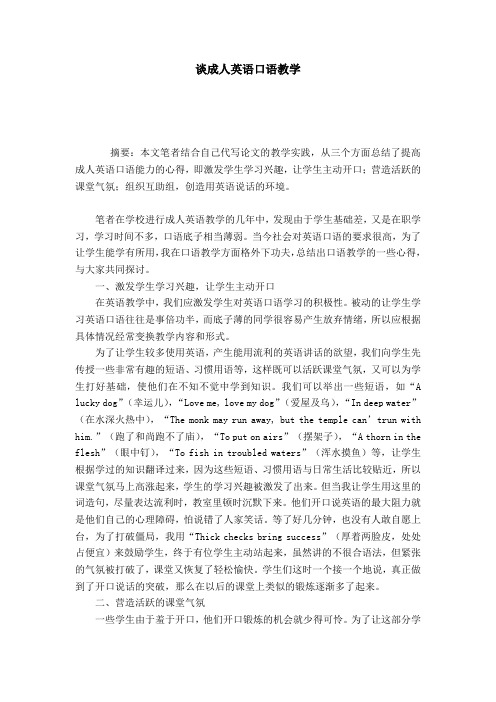
谈成人英语口语教学摘要:本文笔者结合自己代写论文的教学实践,从三个方面总结了提高成人英语口语能力的心得,即激发学生学习兴趣,让学生主动开口;营造活跃的课堂气氛;组织互助组,创造用英语说话的环境。
笔者在学校进行成人英语教学的几年中,发现由于学生基础差,又是在职学习,学习时间不多,口语底子相当薄弱。
当今社会对英语口语的要求很高,为了让学生能学有所用,我在口语教学方面格外下功夫,总结出口语教学的一些心得,与大家共同探讨。
一、激发学生学习兴趣,让学生主动开口在英语教学中,我们应激发学生对英语口语学习的积极性。
被动的让学生学习英语口语往往是事倍功半,而底子薄的同学很容易产生放弃情绪,所以应根据具体情况经常变换教学内容和形式。
为了让学生较多使用英语,产生能用流利的英语讲话的欲望,我们向学生先传授一些非常有趣的短语、习惯用语等,这样既可以活跃课堂气氛,又可以为学生打好基础,使他们在不知不觉中学到知识。
我们可以举出一些短语,如“A lucky dog”(幸运儿),“Love me, love my dog”(爱屋及乌),“In deep water”(在水深火热中),“The monk may run away, but the temple can’trun with him.”(跑了和尚跑不了庙),“To put on airs”(摆架子),“A thorn in the flesh”(眼中钉),“To fish in troubled waters”(浑水摸鱼)等,让学生根据学过的知识翻译过来,因为这些短语、习惯用语与日常生活比较贴近,所以课堂气氛马上高涨起来,学生的学习兴趣被激发了出来。
但当我让学生用这里的词造句,尽量表达流利时,教室里顿时沉默下来。
他们开口说英语的最大阻力就是他们自己的心理障碍,怕说错了人家笑话。
等了好几分钟,也没有人敢自愿上台,为了打破僵局,我用“Thick checks bring success”(厚着两脸皮,处处占便宜)来鼓励学生,终于有位学生主动站起来,虽然讲的不很合语法,但紧张的气氛被打破了,课堂又恢复了轻松愉快。
成人零基础自学英语口语

成人零基础自学英语口语
成人零基础自学英语口语是一个挑战,但也是完全可以做到的。
以下是一些方法和建议,以帮助你准备回答问题:
1.设立明确的目标:首先,确定你想要达到的口语水平和能力。
例如,你可以设定每周学习几个常用句子或主题,并尝试用英语交流。
2.创造学习环境:尽量将英语融入到你的日常生活中。
观看英语
电影和电视剧,听英语音乐和广播,使用英语学习应用程序和网站等。
3.找到合适的学习资源:选择适合你的学习风格和程度的学习材料,如教科书、在线课程、语言学习应用程序和英语学习网站等。
4.练习口语:与其他英语学习者或以英语为母语的人进行对话。
可以通过参加英语角或找一个英语学习伙伴来锻炼口语。
5.学习常用句子和日常用语:掌握一些基本的句子结构和常用表达,这将帮助你开始正常的口语交流。
6.尝试每天进行口语练习:每天花一些时间练习口语,可以通过模仿电影对白,跟读英语材料,或在镜子前练习自己的口语表达等方法。
7.锻炼发音和语调:尽量模仿英语母语者的发音和语调,通过练习发音、听力和模仿来提高你的口语能力。
8.大胆尝试:不要害怕犯错,要大胆尝试用英语进行交流,勇敢地提问和回答问题。
只有通过实践和反复练习,你的口语能力才能不断提高。
最重要的是要持之以恒,坚持不懈地练习和学习,相信自己能够通过自学掌握英语口语能力。
祝你好运!。
浅谈成人英语口语教学
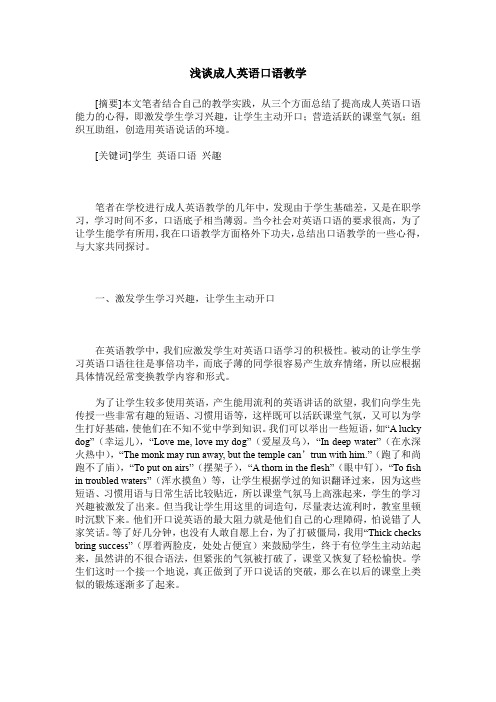
浅谈成人英语口语教学[摘要]本文笔者结合自己的教学实践,从三个方面总结了提高成人英语口语能力的心得,即激发学生学习兴趣,让学生主动开口;营造活跃的课堂气氛;组织互助组,创造用英语说话的环境。
[关键词]学生英语口语兴趣笔者在学校进行成人英语教学的几年中,发现由于学生基础差,又是在职学习,学习时间不多,口语底子相当薄弱。
当今社会对英语口语的要求很高,为了让学生能学有所用,我在口语教学方面格外下功夫,总结出口语教学的一些心得,与大家共同探讨。
一、激发学生学习兴趣,让学生主动开口在英语教学中,我们应激发学生对英语口语学习的积极性。
被动的让学生学习英语口语往往是事倍功半,而底子薄的同学很容易产生放弃情绪,所以应根据具体情况经常变换教学内容和形式。
为了让学生较多使用英语,产生能用流利的英语讲话的欲望,我们向学生先传授一些非常有趣的短语、习惯用语等,这样既可以活跃课堂气氛,又可以为学生打好基础,使他们在不知不觉中学到知识。
我们可以举出一些短语,如“A lucky dog”(幸运儿),“Love me, love my dog”(爱屋及乌),“In deep water”(在水深火热中),“The monk may run away, but the temple can’trun with him.”(跑了和尚跑不了庙),“To put on airs”(摆架子),“A thorn in the flesh”(眼中钉),“To fish in troubled waters”(浑水摸鱼)等,让学生根据学过的知识翻译过来,因为这些短语、习惯用语与日常生活比较贴近,所以课堂气氛马上高涨起来,学生的学习兴趣被激发了出来。
但当我让学生用这里的词造句,尽量表达流利时,教室里顿时沉默下来。
他们开口说英语的最大阻力就是他们自己的心理障碍,怕说错了人家笑话。
等了好几分钟,也没有人敢自愿上台,为了打破僵局,我用“Thick checks bring success”(厚着两脸皮,处处占便宜)来鼓励学生,终于有位学生主动站起来,虽然讲的不很合语法,但紧张的气氛被打破了,课堂又恢复了轻松愉快。
成人英语零基础如何练口语-提升技巧-注意事项

成人英语零基础如何练口语-提升技巧-注意事项成人要想零基础学习英语口语,一要练好音标,熟悉发音;二是积存词句,培养语感,如果想具体了解成人英语零基础如何练口语,那无妨接着往下看吧!1、练好音标,熟悉发音成人存在着问题就是英语发音糟糕导致不想开口,不开口的话,发音是否准确自己难以分辨。
针关于零基础的英语,建议要练好音标,熟悉26个字母、记忆字母音标、学习国际音标,掌握发音规则,这关于记单词、说句子都有很大的帮助。
从最简单的的开始,按部就班,开口重复学习发音有利于英语脱口而出,试想一下,每次把单词或者句子重复说几遍,甚至十几遍。
以此循环反复,越熟悉发音,那你的口语表达就越准确。
2、积存词句,培养语感在熟悉音标之后,就要积存一定的词汇量。
很多人都说练好英语口语只要模仿就好了,这是对的,但是在模仿的过程中要仔细留点心思记单词,因为想学好英语,肯定要先积存一定的词汇量,只有这样才干有话可说,有词可读,符合了语言形成的思维。
当有了一定的基础,这时候就要多一遍读文章,看美剧等,培养自己的语感,可以模仿发音,语气语调,千万不要害怕,大胆开〔口才〕能进步。
成人应该更加清楚,语言的学习是要经过长期的积存过程,不可能一蹴而就。
提升英语口语的突破口就是要大胆开口说英语,然后不断输入英语知识,再开口输出。
特别是零基础的学习者,更要扎实从音标开始学起,熟悉发音后再去培养语感,形成英语逻辑思维。
2英语口语提升技巧1、营造英语环境,建立英语思维很多人都觉得自己的英语成绩不错,但只是仅停留在“应试〞方面。
大家都很少接触真实英语交际情景,甚至只是在英语课堂之中,没有使用英语的氛围,这样怎么会锻炼到英语口语呢。
要想提升英语口语,营造英语环境很重要。
可以通过看美剧等,仿佛置身于真实场景,这是新颖且非常有效的学习口语方法,结合一些视听软件工具,实现视,听,跟读,真实再现场景提升英语学习兴趣,建立英语思维。
2、主动大胆开口说英语任何一种语言都是先有声音,后有文字,如果发音不准,别人就听不懂,因此要想学好英语,一定要大胆开口,开口读、开口说。
成人怎么零基础学英语口语-学英语口语的方法
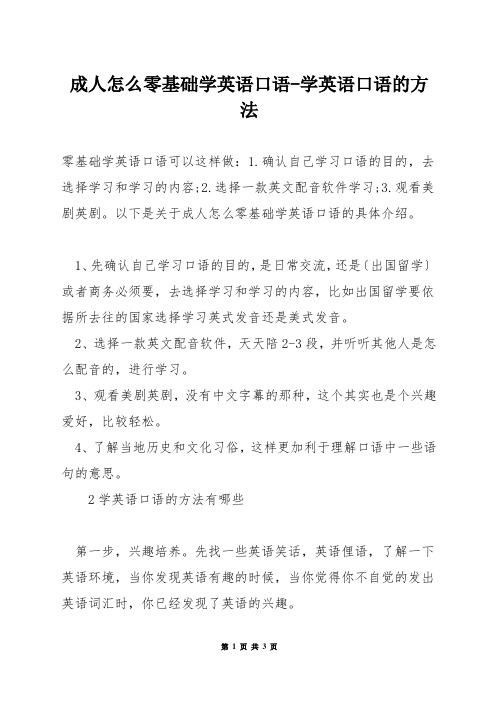
成人怎么零基础学英语口语-学英语口语的方法零基础学英语口语可以这样做:1.确认自己学习口语的目的,去选择学习和学习的内容;2.选择一款英文配音软件学习;3.观看美剧英剧。
以下是关于成人怎么零基础学英语口语的具体介绍。
1、先确认自己学习口语的目的,是日常交流,还是〔出国留学〕或者商务必须要,去选择学习和学习的内容,比如出国留学要依据所去往的国家选择学习英式发音还是美式发音。
2、选择一款英文配音软件,天天陪2-3段,并听听其他人是怎么配音的,进行学习。
3、观看美剧英剧,没有中文字幕的那种,这个其实也是个兴趣爱好,比较轻松。
4、了解当地历史和文化习俗,这样更加利于理解口语中一些语句的意思。
2学英语口语的方法有哪些第一步,兴趣培养。
先找一些英语笑话,英语俚语,了解一下英语环境,当你发现英语有趣的时候,当你觉得你不自觉的发出英语词汇时,你已经发现了英语的兴趣。
第二步,大量的词汇。
必须有大量的词汇作为你学习的后盾,什么都不能建立在空中楼阁中,学习英语就像是盖房子,单词就是一块块的砖,有了砖才干建房子。
第三步,典型语法结构。
找一本介绍语法的书,中文介绍的也可以,了解一下英文的语法结构。
第四步,培养语感。
这个要靠阅读和保持,天天保持读1-2篇文章,每篇文章读1-2遍,碰到好的文章要背下来,理解文章的结构,总结文章中出现的经典语法,经典单词,第二步和第三步的学习已经开始发挥作用了。
第五步,多听多练。
前面的几步只能帮助我们学好哑巴英语,从这里我们真正的开始张开嘴巴说话。
从最初级的听力入手,听懂每个单词、每句话、每段话及每篇文章。
逐步增加难度。
跟读英语,一方面强化听力,一方面训练口语,同时还能培养语感。
注意发音的准确性。
第六步,可以适当的放松一下了,看看英文电影,找自己喜爱的类型,刚开始可以选择带字幕的电影,等自己的词汇和语法都掌握了,你可以丢开字幕,像看中文电影一样看英文电影了。
3英语口语学习有哪些方法第一.敢于开口说英语,不要怕犯错误。
浅谈成人英语口语教学

、
激发学 生学 习兴趣 , 让学 生主动开 口
语 言是 一项 技能 , 没有 大量 的 实践 。 准确 而 熟练地 掌 握英 语
口语是不 可能的 。在课上 , 有些学生 一向是沉 默的 听者 , 而不 是积 极 的说者 , 有很 多原 因 , 重要 的原 因是他们 有心 理压 力 。 这 最 害怕
一
英
多 了起来 。 二 、 有限 的课堂 时间 在 向学 生介绍丰 富的语言材 料
教 师备课 要做 到精心 、 充分 。 课堂上 需要的材料 , 书面 材料 、 如 图片 、 卡片 、 幻灯 片、 光碟等要 在上课前 准备好 。 口语练 习中可能用
到的词 汇、句型要 准备充 分 ,详 细地记 在教 案上或 写在幻 灯片上
说 话的 习惯 。
度地给 学生提 供实践 语言 的机会 , 加大学 生的 口语 实践量 。在 训 练过程 中, 我尽 量 留给 学生 充分 的 空间 , 学 习有困难 的 学生 有 使 机 会弥补 自己的不足 。 为了能 让学 生 对英语 口语学 习产 生积 极 性 ,我根 据具 体 情 况 , 常变换教 学 内容 和形式 。如 向学生 传授 一些 非常有 趣 的短 经 语、 习惯用 语等 。 活跃 了课 堂气 氛 , 既 又可 以为学 生打 好基 础 , 使 他 们在不知 不觉 中学到了知识 。再 如举 出像 “ c y o ” 幸运 A l k g ( u d
零基础成人怎么学英语口语-口语从零开始怎么学

零基础成人怎么学英语口语-口语从零开始怎么学零基础成人学英语口语必须要这样做:一是调整学习心态;二是找到一个优良的英语环境;三是必须系统地学习。
如果想具体了解零基础成人怎么学英语口语,那无妨接着往下看吧!第一,调整学习心态。
很多成年人因为英语基础差,找不到合适的学习方法,或者面对各种知识点无法开始而感到沮丧。
他们往往很难保持学习,所以进步甚微。
这个时候,我们必须调整心态,保持下去。
第二,找到一个优良的英语环境。
学习语言环境对英语学习非常重要。
为什么我们能把母语说得这么好?因为我们一直生活在母语的语言环境中。
同样,如果我们想学好英语,沉醉在英语环境中,我们可以逐渐形成英语思维,你的英语会像母语一样流利。
第三,必须系统地学习。
对我们成年人来说,过去缺乏系统的学习导致了英语能力的缺乏,所以现在全面系统地学习英语尤为重要,就像盖房子一样,基础是基础,基础是坚实的。
科学的课程将帮助你打下优良的基础,一步一步地爬上去,理论与施行相结合,阅读、写作和听说相结合,你的英语学习全面而坚实。
2 成人英语口语从零开始怎么学1、如果是零基础的话就必须要从字母开始,这也是最基础的内容之一。
单词发音与音标有很大的关系,后者学会了,单词学起来就更容易。
成人在自学的过程中会有较大大的难度,所以学习音标建议通过专业的老师指导进行,以免自学时因发音不准确而导致无法学习正确的单词,也可以从网上找一些英语视频来学习。
2、关于单词的学习,记忆大量的单词是英语学习者们必须要掌握的,但是面对这么多的英语单词要如何记忆呢?单词的记忆可通过多种方法,比如可以利用归类、对比、组合等等,找到合适自己的记忆方式,会有很大的收获。
但是关于很多没有英语基础的成年人来说学单词是一个重要的方面,最好天天都抽出时间进行背诵。
3、多学习多开口,零基础学英语其实一个重要的方面就是要多开口说,要大胆地说出来才干知道自己的发音如何。
成人学习英语多是以口语为主,所以一定要给自己制造这样的机会进行学习,多与人对话。
成人零基础自学英语口语
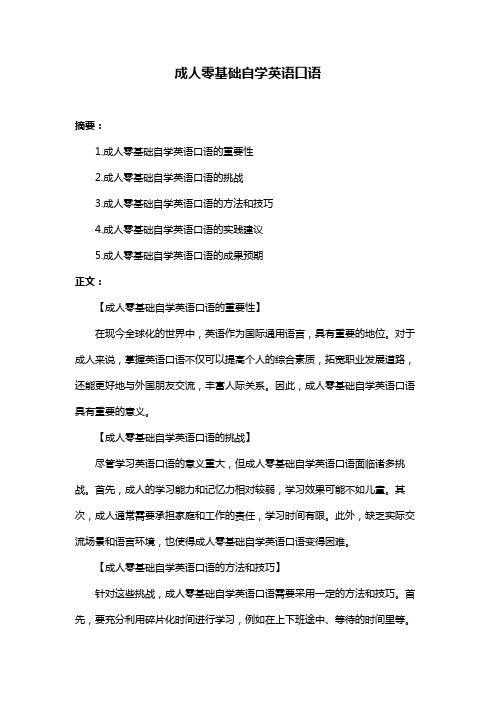
成人零基础自学英语口语摘要:1.成人零基础自学英语口语的重要性2.成人零基础自学英语口语的挑战3.成人零基础自学英语口语的方法和技巧4.成人零基础自学英语口语的实践建议5.成人零基础自学英语口语的成果预期正文:【成人零基础自学英语口语的重要性】在现今全球化的世界中,英语作为国际通用语言,具有重要的地位。
对于成人来说,掌握英语口语不仅可以提高个人的综合素质,拓宽职业发展道路,还能更好地与外国朋友交流,丰富人际关系。
因此,成人零基础自学英语口语具有重要的意义。
【成人零基础自学英语口语的挑战】尽管学习英语口语的意义重大,但成人零基础自学英语口语面临诸多挑战。
首先,成人的学习能力和记忆力相对较弱,学习效果可能不如儿童。
其次,成人通常需要承担家庭和工作的责任,学习时间有限。
此外,缺乏实际交流场景和语言环境,也使得成人零基础自学英语口语变得困难。
【成人零基础自学英语口语的方法和技巧】针对这些挑战,成人零基础自学英语口语需要采用一定的方法和技巧。
首先,要充分利用碎片化时间进行学习,例如在上下班途中、等待的时间里等。
其次,可以通过观看英文影视剧、听英文歌曲等方式,增强对英语的兴趣,并在潜移默化中提高口语能力。
此外,可以寻找语言交换伙伴,与外国朋友进行线上或线下的交流,提高实际口语应用能力。
【成人零基础自学英语口语的实践建议】在实际学习过程中,成人零基础自学英语口语还需要遵循一定的建议。
要注重发音和基本语法的学习,形成正确的语言基础。
同时,要积累常用的日常用语和句型,提高口语表达的准确性和流利度。
此外,要勇于开口说英语,不怕犯错,积极参与各类英语口语活动,以提高自己的口语实际运用能力。
【成人零基础自学英语口语的成果预期】通过长期的努力和坚持,成人零基础自学英语口语可以取得显著的成果。
不仅能够提高个人的英语水平,还能为工作和生活带来便利。
成人零基础英语口语教学计划方案

成人零基础英语口语教学计划方案全文共10篇示例,供读者参考篇1Hello everyone! Today I'm going to share with you a plan to teach adults English speaking from scratch. It's going to be super fun and easy to follow, just like our regular English class!Step 1: Start with the basicsFirst, we need to introduce the adults to the English alphabet and basic pronunciation. We can use games, songs, and flashcards to make it more interactive and engaging. We'll start with simple words like "hello," "goodbye," and "thank you."Step 2: Daily conversationsNext, we'll move on to daily conversations such as introducing oneself, asking for directions, ordering food, and making simple requests. Role-playing activities and real-life scenarios will help them practice speaking in a natural way.Step 3: Expand vocabularyTo build their vocabulary, we'll introduce new words and phrases related to different topics like family, hobbies, work, andtravel. We can use pictures, videos, and storybooks to make learning more interesting and memorable.Step 4: Grammar and sentence structureWe'll teach adults basic grammar rules and sentence structure, such as subject-verb agreement, tenses, and word order. We'll break down complex concepts into simpler terms and provide plenty of examples for practice.Step 5: Practice, practice, practiceFinally, we'll encourage adults to practice speaking English as much as possible. We can organize group activities, pair them up for conversational practice, or even set up a mini English cafe where they can order food and chat in English.By following this step-by-step plan, we can help adults improve their English speaking skills and gain confidence in communicating with others. Let's make learning English fun and enjoyable for everyone! Let's cheer for our adult English learners! Go go go!篇2Title: Fun and Easy English Conversation Class for Adults with Zero BasisHey guys! Welcome to our English conversation class for adults with zero basis! I'm so excited to start this journey with you all. Learning English can be super fun and easy, so don't worry if you don't know any English at all. We'll start from the very beginning and take it step by step.First of all, let's make sure we create a relaxed and friendly atmosphere in our class. Learning a new language can be intimidating, but it's important to feel comfortable and confident. Let's all encourage each other and not be afraid to make mistakes. Learning is all about trying new things and improving day by day.In our class, we'll focus on practical and everyday English conversations. We'll learn how to introduce ourselves, talk about our hobbies, order food in a restaurant, and much more. We'll practice speaking, listening, and even a little bit of writing. Remember, practice makes perfect!To make our class more interactive and engaging, we'll use games, role-plays, and group activities. Learning through play is not only effective but also a lot of fun! Let's be creative and think outside the box when it comes to learning English.Homework will be assigned after each class to reinforce what we've learned. Don't worry, it won't be anything too difficult. Justa few exercises or a short writing assignment to keep our English skills sharp.Finally, let's set some goals for ourselves. Whether it's being able to hold a basic conversation in English, traveling to an English-speaking country with confidence, or simply feeling more comfortable speaking in English, let's work together to achieve our goals.I can't wait to see how much progress we'll make together. Let's have a blast learning English! Let's do this!篇3Okay! I'll write a plan for teaching adults with zero English foundation in a fun and simple way like how we talk in elementary school.Title: Fun and Easy English Speaking Plan for Adults with Zero FoundationHi friends! Today I want to share with you a super cool plan to help adults who are just starting to learn English. Learning a new language can be super fun and exciting, so let's get started with our plan!Step 1: Let's Go!First, we need to create a cozy and comfy learning environment. Get some colorful posters, cute stickers, and maybe some fun toys to decorate the classroom. This will make learning English feel like a fun adventure!Step 2: Hello, My Name Is...Now, let's start with the basics. Teach the adults simple phrases like "Hello, my name is..." and "Nice to meet you." Practice saying these phrases together until everyone feels comfortable.Step 3: Let's Play Games!Games are a great way to learn English. Play charades, Pictionary, or even a simple game of Simon Says in English. This will help the adults practice speaking and listening in a fun way.Step 4: Sing Along!Music can also help with learning English. Choose some catchy songs and teach the adults the lyrics. Singing along will improve pronunciation and help them remember new words.Step 5: Let's Chat!Encourage the adults to have short conversations in English. Start with simple topics like hobbies, food, or weather. This willboost their confidence in speaking English and help them become more fluent.Step 6: Practice, Practice, Practice!Lastly, remind the adults to practice English every day. Encourage them to watch English movies, listen to English podcasts, or even chat with native English speakers online. The more they practice, the better they will become!And there you have it, our super cool plan for teaching adults with zero English foundation. Learning English can be so much fun, so let's keep practicing and improving together! Good luck, everyone!篇4Title: Fun and Easy Adult English Oral Teaching PlanHey guys, have you ever thought about learning English as a grown-up? It's super cool and can open up a whole new world for you! In this teaching plan, I'm going to show you how to learn English from scratch and have fun at the same time. Let's get started!First things first, we need to start with the basics. We'll learn simple greetings like "Hello", "How are you?", and "What's yourname?". These are the building blocks of English conversations, and you'll be using them all the time.Next, we'll move on to everyday English phrases. We'll learn how to talk about food, clothes, weather, and more. You'll be able to chat with your friends in no time!After that, we'll practice speaking in different situations. We'll have conversations at a restaurant, in a store, or on the phone. You'll feel confident talking to people in English wherever you go.To make learning English even more fun, we'll play games and do fun activities. We'll have role-playing exercises, word games, and music sessions. Learning English doesn't have to be boring!Lastly, we'll review what we've learned and set goals for the future. You'll see how much you've improved and feel proud of yourself. With practice and dedication, you'll be speaking English like a pro!So what do you think? Are you ready to start your English learning journey? Let's do this together and have a blast while learning a new language! Go for it!篇5Title: Exciting English Oral Teaching Plan for Adults with Zero BasisHello everyone, I'm your English teacher today! Are you ready to learn some fun and practical oral English with me? Let's get started with our exciting English oral teaching plan for adults with zero basis.Objective:Our goal is to help adults with zero English basis to improve their speaking skills and build confidence in oral communication.Lesson Plan:1. Icebreaker Activities:- Let's start with some icebreaker activities to get to know each other and create a friendly atmosphere in the class.- We can play games like "Two Truths and a Lie" or "Tell Me About Your Weekend" to practice speaking in a relaxed setting.2. Basic English Vocabulary:- Next, we will learn some basic English vocabulary related to daily life, such as greetings, numbers, colors, and common objects.- We can use flashcards, pictures, and real-life examples to make the learning process more interactive and engaging.3. Role-Playing Exercises:- To practice speaking in real-life situations, we will dorole-playing exercises where students can act out dialogues in scenarios like ordering food at a restaurant, asking for directions, and making phone calls.- This will help students apply their knowledge of vocabulary and grammar in a practical way.4. Pronunciation Practice:- We will also focus on pronunciation practice to help students improve their speaking clarity and fluency.- Students can practice pronouncing words, phrases, and sentences with correct intonation and stress through fun tongue twisters and speaking drills.5. Group Activities:- Group activities like discussions, debates, and presentations will give students the opportunity to express their opinions and ideas in English.- This will enhance their speaking skills, critical thinking, and confidence in using the language.6. Weekly Conversations:- Every week, students will have the chance to haveone-on-one conversations with the teacher to practice speaking and receive personalized feedback.- This will allow students to track their progress and focus on areas for improvement.Conclusion:By following this exciting English oral teaching plan, adults with zero basis can make significant progress in their speaking skills and gain confidence in communicating in English. Remember, practice makes perfect, so let's keep practicing and speaking English every day!That's it for today's lesson. I hope you enjoyed learning English with me. See you next time! Bye-bye!篇6Sure! Here is a fun, childlike version of a teaching plan for adults with zero English background:Hey guys, so today we're gonna talk about how to learn English if you're a grown-up and you don't know anything about it yet. Don't worry, it's gonna be super easy and fun!First things first, let's start with some basic words and phrases. We're gonna learn things like "hello", "goodbye", "thank you", and "please". These are important because you can use them every day when talking to people.Next, let's move on to some simple sentences. We can practice saying things like "My name is [your name]", "I am from [your country]", and "I like [your favorite thing]". This way, you can introduce yourself and talk about your interests.After that, we'll work on some common questions and answers. We can practice asking things like "How are you?", "What is your job?", and "Where do you live?". And of course, we'll learn how to respond to these questions too.To make things more exciting, we can play games, watch videos, and even sing songs in English. This will help you remember new words and phrases better.And don't forget to practice speaking English every day. You can talk to yourself in the mirror, chat with friends who are also learning, or even try talking to native English speakers online.By following this plan and putting in some effort, you'll be speaking English like a pro in no time! Just remember to have fun and be patient with yourself. Good luck!篇7Title: Fun and Easy English Speaking Teaching Plan for Adults with Zero BasisHello everyone! Today I'm going to share with you a super cool plan to help adults who have zero basis in English to learn how to speak English like a pro. Are you ready? Let's get started!Step 1: Vocabulary BuildingFirst things first, we need to build our vocabulary. We can start by learning some basic everyday words and phrases. For example, "Hello", "Good morning", "Thank you", "Please", and so on. We can make flashcards or use colorful stickers to help memorize the words.Step 2: Grammar FunNext, let's dive into some grammar fun! We can start with simple sentences like "I am hungry", "She is happy", or "They are playing". We can act out the sentences to make it more fun andeasier to remember. Remember to always practice speaking out loud!Step 3: Practice Makes PerfectPractice makes perfect, right? Let's practice speaking English every day. We can have conversations with our friends, family members, or even with ourselves in front of the mirror. Don't be shy, just keep practicing!Step 4: Fun ActivitiesLearning English can be super fun! We can watch English cartoons or movies, listen to English songs, or even play English games. The key is to enjoy the process and not feel stressed about it. Remember, practice makes perfect!Step 5: Review and RewardLastly, let's review what we have learned and reward ourselves for our hard work. We can review our vocabulary, practice some grammar exercises, or even have a mini English speech competition with our friends. And don't forget to reward ourselves with some yummy treats or a fun outing!And there you have it, our super cool plan to help adults with zero basis in English to become English speaking pros. Remember, practice makes perfect and don't be afraid to makemistakes. So keep practicing, keep learning, and most importantly, have fun! Good luck!篇8Hello everyone! Today I want to share with you a super cool plan to learn English from scratch. It's gonna be so much fun and you'll be speaking like a pro in no time!First, let's start with some basic greetings. You can say "hello" when you meet someone and "goodbye" when you're leaving. Easy peasy, right?Next, let's learn some simple phrases for everyday situations. For example, if you want to ask someone how they are, you can say "How are you?" And if you want to introduce yourself, you can say "My name is [your name]." See, it's not that hard!Now, let's move on to some vocabulary. You can start with common words like "apple," "banana," "cat," and "dog." Try using them in sentences to practice your speaking skills.Don't forget about grammar! Learn how to make simple sentences using the verb "to be" and basic tenses like present simple. For example, "I am a student" or "She likes to read."To improve your listening skills, watch English movies or TV shows with subtitles. This will help you get used to the language and pronunciation.Lastly, practice speaking with a friend or a language partner. It's always more fun to learn with someone else!So there you have it, an awesome plan to learn English from scratch. Just remember to practice every day and have fun with it. You'll be speaking like a native in no time! Good luck!篇9Hey guys! Today I want to share with you a super cool plan to help grown-ups learn English from scratch. It's gonna be so much fun, I promise!First off, we need to make sure the grown-ups feel comfortable and relaxed when learning English. We can start off with some easy and fun ice-breaker games to get everyone talking and laughing. This will help them feel more confident about speaking in English.Next, we can introduce some basic English words and phrases using real-life situations. For example, we can teach them how to order food in a restaurant, ask for directions, oreven just have a simple conversation with a friend. Role-playing games can be a great way to practice these new skills in a fun and interactive way.To keep things interesting, we can also incorporate songs, videos, and games into the lessons. This will help the grown-ups improve their listening and speaking skills while having a great time.As the lessons progress, we can introduce more complex grammar rules and vocabulary. But don't worry, we'll make sure to break it down into simple and easy-to-understand explanations.And last but not least, we'll celebrate their progress with a fun English-speaking party where they can show off their new language skills and feel proud of how far they've come.So there you have it, guys! With a mix of fun games, real-life situations, and lots of encouragement, we can help grown-ups learn English from scratch in a super cool and exciting way. Let's do this!篇10Title: Let's Learn English Together! (In the voice of a primary school student)Yo guys! Are you ready to dive into the world of English with me? I’m super excited to share with you this awesome plan to help grown-ups learn English from scratch!Step 1 – Basic English Words:First things first, we gotta start with the basics, like learning simple words in English. Let's begin with words we use every day, like "hello", "goodbye", "please", "thank you", and "sorry". We can practice saying them out loud and using them in sentences.Step 2 – Practice Makes Perfect:To get good at anything, we gotta practice, practice, practice! Let’s set aside some time each day to practice English. We can listen to English songs, watch English cartoons, or read English books. The more we practice, the better we’ll get!Step 3 – Conversational English:Once we’ve got a good grasp of basic words, it’s time to start putting them together to have conversations. We can practice simple dialogues like introducing ourselves, ordering food in a restaurant, or asking for directions. This way, we’ll get more comfortable speaking in English.Step 4 – Grammar Fun:Grammar might sound boring, but it’s super important to make sure we’re speaking English correctly. We can learn about basic grammar rules like using "am", "is", and "are" for present tense, adding "s" for plura ls, and using "can" for abilities. We’ll have fun practicing these rules with games and activities.Step 5 – Vocabulary Expansion:To sound more fluent in English, we need to expand our vocabulary. Let’s learn new words and phrases related to topic s we’re interested in, like animals, food, sports, or music. We can make flashcards, play word games, or even challenge each other to use new words in sentences.Step 6 – Real Life Practice:The best way to become fluent in English is to use it inreal-life situations. Let’s practice talking to native English speakers, watching English movies without subtitles, or even traveling to English-speaking countries. The more we immerse ourselves in English, the better we’ll become!So, are you guys ready to embark on this English learning adventure with me? Let’s have fun, make mistakes, and most importantly, never give up! Remember, practice makes perfect,and soon enough, we’ll be speaking English like pros! Let’s do this!(Note: This plan is designed for beginners with zero English knowledge and can be customized based on individual learning needs and preferences.)。
成人口语完整教案
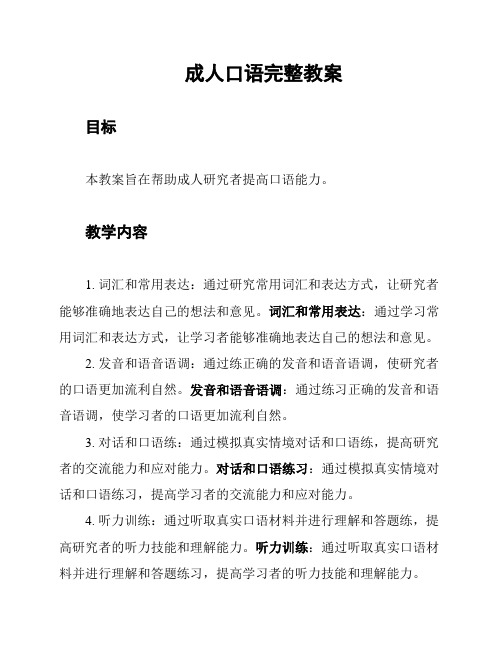
成人口语完整教案目标本教案旨在帮助成人研究者提高口语能力。
教学内容1. 词汇和常用表达:通过研究常用词汇和表达方式,让研究者能够准确地表达自己的想法和意见。
词汇和常用表达:通过学习常用词汇和表达方式,让学习者能够准确地表达自己的想法和意见。
2. 发音和语音语调:通过练正确的发音和语音语调,使研究者的口语更加流利自然。
发音和语音语调:通过练习正确的发音和语音语调,使学习者的口语更加流利自然。
3. 对话和口语练:通过模拟真实情境对话和口语练,提高研究者的交流能力和应对能力。
对话和口语练习:通过模拟真实情境对话和口语练习,提高学习者的交流能力和应对能力。
4. 听力训练:通过听取真实口语材料并进行理解和答题练,提高研究者的听力技能和理解能力。
听力训练:通过听取真实口语材料并进行理解和答题练习,提高学习者的听力技能和理解能力。
教学步骤1. 词汇和常用表达:词汇和常用表达:- 引入常用词汇及表达方式,介绍其意义和用法。
- 给研究者提供词汇表和例句,让他们熟悉并学会正确运用。
- 进行相关练,如填空、造句等,以巩固所学内容。
2. 发音和语音语调:发音和语音语调:- 详细介绍英语语音的特点和常见发音错误。
- 给研究者示范正确的发音和语音语调,并进行跟读练。
- 提供口音修正的练材料,帮助研究者纠正发音问题。
3. 对话和口语练:对话和口语练习:- 设计真实情境对话,让研究者角色扮演并进行对话练。
- 提供一对一和小组口语练的机会,让研究者互动交流。
- 提供反馈和建议,帮助研究者改进口语表达和交流能力。
4. 听力训练:听力训练:- 播放真实口语材料,如对话、新闻、演讲等,让研究者听取并理解。
- 设计听力题目,包括听写、选择、填空等,让研究者进行听力训练。
- 给予答案解析和反馈,帮助研究者提高听力技能。
教学评估1. 口语表达:通过对研究者口语表达的评估,检查他们在词汇和常用表达、发音和语音语调、对话和口语练中的表现。
口语表达:通过对学习者口语表达的评估,检查他们在词汇和常用表达、发音和语音语调、对话和口语练习中的表现。
成人零基础自学英语口语
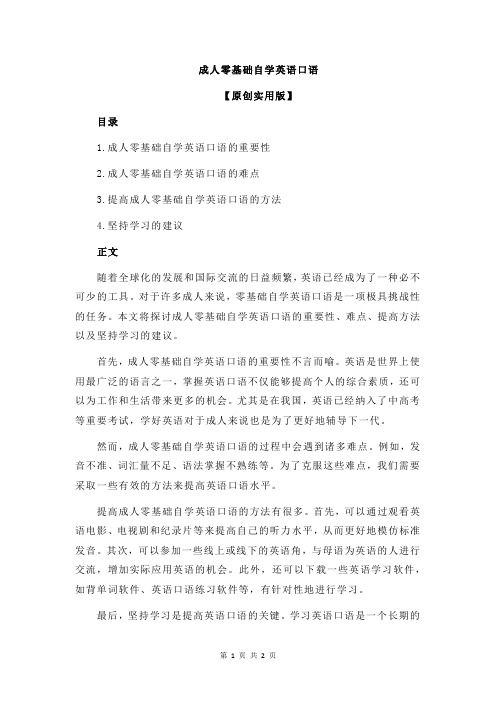
成人零基础自学英语口语【原创实用版】目录1.成人零基础自学英语口语的重要性2.成人零基础自学英语口语的难点3.提高成人零基础自学英语口语的方法4.坚持学习的建议正文随着全球化的发展和国际交流的日益频繁,英语已经成为了一种必不可少的工具。
对于许多成人来说,零基础自学英语口语是一项极具挑战性的任务。
本文将探讨成人零基础自学英语口语的重要性、难点、提高方法以及坚持学习的建议。
首先,成人零基础自学英语口语的重要性不言而喻。
英语是世界上使用最广泛的语言之一,掌握英语口语不仅能够提高个人的综合素质,还可以为工作和生活带来更多的机会。
尤其是在我国,英语已经纳入了中高考等重要考试,学好英语对于成人来说也是为了更好地辅导下一代。
然而,成人零基础自学英语口语的过程中会遇到诸多难点。
例如,发音不准、词汇量不足、语法掌握不熟练等。
为了克服这些难点,我们需要采取一些有效的方法来提高英语口语水平。
提高成人零基础自学英语口语的方法有很多。
首先,可以通过观看英语电影、电视剧和纪录片等来提高自己的听力水平,从而更好地模仿标准发音。
其次,可以参加一些线上或线下的英语角,与母语为英语的人进行交流,增加实际应用英语的机会。
此外,还可以下载一些英语学习软件,如背单词软件、英语口语练习软件等,有针对性地进行学习。
最后,坚持学习是提高英语口语的关键。
学习英语口语是一个长期的过程,需要付出时间和精力。
因此,建议成人在学习过程中要有耐心和毅力,每天抽出一定的时间进行学习和练习。
此外,可以设定短期和长期的学习目标,以便更好地激励自己。
总之,成人零基础自学英语口语虽然具有一定的难度,但只要掌握正确的方法并坚持学习,就一定能够取得显著的进步。
在这个过程中,我们需要关注英语口语的重要性、克服难点、采用有效的提高方法以及保持学习的毅力。
成人零基础自学英语口语
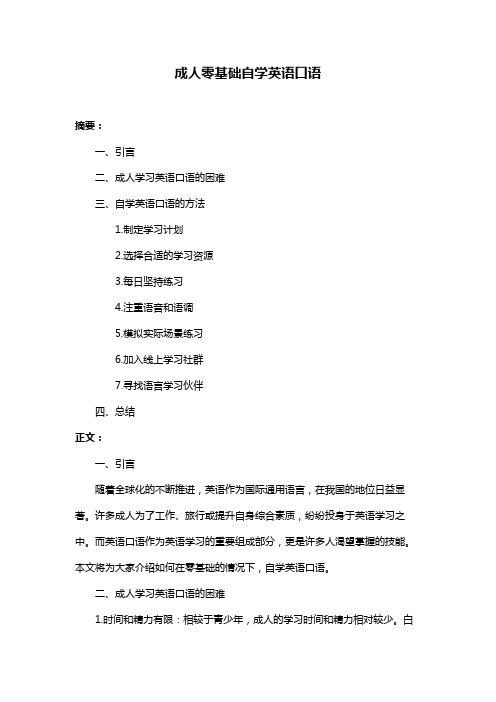
成人零基础自学英语口语摘要:一、引言二、成人学习英语口语的困难三、自学英语口语的方法1.制定学习计划2.选择合适的学习资源3.每日坚持练习4.注重语音和语调5.模拟实际场景练习6.加入线上学习社群7.寻找语言学习伙伴四、总结正文:一、引言随着全球化的不断推进,英语作为国际通用语言,在我国的地位日益显著。
许多成人为了工作、旅行或提升自身综合素质,纷纷投身于英语学习之中。
而英语口语作为英语学习的重要组成部分,更是许多人渴望掌握的技能。
本文将为大家介绍如何在零基础的情况下,自学英语口语。
二、成人学习英语口语的困难1.时间和精力有限:相较于青少年,成人的学习时间和精力相对较少。
白天要工作,晚上回家还要照顾家庭,能用来学习的时间并不多。
2.基础薄弱:许多成人学习英语时,发现自己的英语基础非常薄弱,甚至连字母都认不全。
这使得他们在学习口语时,倍感吃力。
3.缺乏语言环境:在我国,英语并不是主流语言。
成人在日常生活中很难找到说英语的机会,这使得他们在练习口语时,缺乏实际应用的场景。
三、自学英语口语的方法1.制定学习计划:根据自己的时间安排,合理分配学习英语口语的时间。
每天至少抽出30分钟进行口语练习。
2.选择合适的学习资源:市面上有很多英语口语教材,如《新概念英语》、《英语口语速成》等。
成人可以根据自己的需求和英语水平,选择适合自己的教材。
3.每日坚持练习:学习英语口语需要持之以恒。
每天都要按照教材进行练习,不断积累词汇和句型。
4.注重语音和语调:英语口语的语音和语调非常重要。
在学习过程中,要尽量模仿教材中的发音和语调,让自己听起来更像母语为英语的人。
5.模拟实际场景练习:在学习过程中,要尝试模拟实际场景进行练习,如购物、问路、就餐等。
这样在实际生活中遇到类似场景时,就能派上用场。
6.加入线上学习社群:许多线上平台都有英语学习社群,成人可以加入这些社群,与其他学习者交流心得,共同进步。
7.寻找语言学习伙伴:如果条件允许,可以寻找一位母语为英语的朋友,进行口语练习。
成人零基础自学英语口语
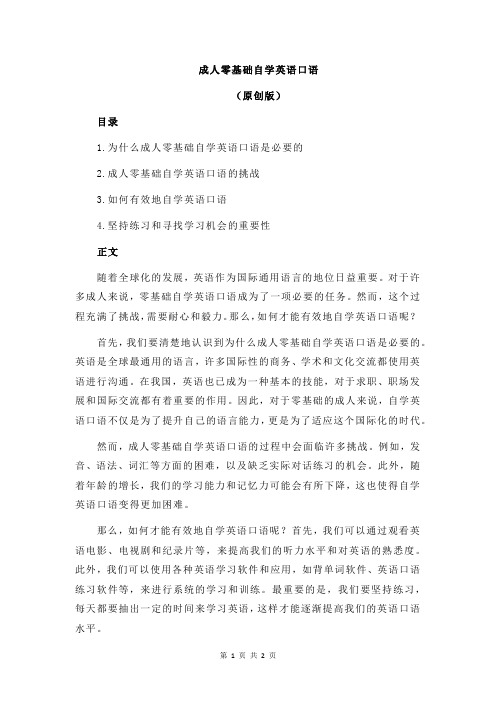
成人零基础自学英语口语(原创版)目录1.为什么成人零基础自学英语口语是必要的2.成人零基础自学英语口语的挑战3.如何有效地自学英语口语4.坚持练习和寻找学习机会的重要性正文随着全球化的发展,英语作为国际通用语言的地位日益重要。
对于许多成人来说,零基础自学英语口语成为了一项必要的任务。
然而,这个过程充满了挑战,需要耐心和毅力。
那么,如何才能有效地自学英语口语呢?首先,我们要清楚地认识到为什么成人零基础自学英语口语是必要的。
英语是全球最通用的语言,许多国际性的商务、学术和文化交流都使用英语进行沟通。
在我国,英语也已成为一种基本的技能,对于求职、职场发展和国际交流都有着重要的作用。
因此,对于零基础的成人来说,自学英语口语不仅是为了提升自己的语言能力,更是为了适应这个国际化的时代。
然而,成人零基础自学英语口语的过程中会面临许多挑战。
例如,发音、语法、词汇等方面的困难,以及缺乏实际对话练习的机会。
此外,随着年龄的增长,我们的学习能力和记忆力可能会有所下降,这也使得自学英语口语变得更加困难。
那么,如何才能有效地自学英语口语呢?首先,我们可以通过观看英语电影、电视剧和纪录片等,来提高我们的听力水平和对英语的熟悉度。
此外,我们可以使用各种英语学习软件和应用,如背单词软件、英语口语练习软件等,来进行系统的学习和训练。
最重要的是,我们要坚持练习,每天都要抽出一定的时间来学习英语,这样才能逐渐提高我们的英语口语水平。
此外,寻找学习机会也是非常重要的。
我们可以参加各种英语角、语言交流活动,和外国人或者同样学习英语的人进行实际对话,以此来提高我们的英语口语能力。
同时,我们也可以寻找线上的语言交换伙伴,通过互联网进行语言交流和学习。
总的来说,成人零基础自学英语口语虽然充满了挑战,但是只要我们有足够的耐心和毅力,就一定能够成功。
口语训练教案

口语训练教案一、教学目标本教学教案的主要目标是帮助学生提高口语表达能力,培养他们在日常生活中有效交流的能力。
通过本教学教案的实施,学生应能够:1. 了解口语训练的重要性以及如何有效进行口语训练;2. 学会简单的口语表达技巧,如提问、回答、辩论等;3. 提高口语流畅度和准确性,增强表达自己观点的能力。
二、教学内容1. 口语训练的重要性口语在日常交流中起着重要的作用,它可以帮助我们更好地沟通,增进人际关系,并提高自信心。
通过一系列的口语训练活动,学生将能够更好地掌握口语技巧,提高自己的表达能力。
2. 口语训练策略a) 听力训练:学生可以通过听录音、对话和讲解来提高自己的听力理解能力;b) 口语练习:学生可以通过模仿录音、角色扮演和小组讨论等方式进行口语练习;c) 词汇扩展:学生可以通过积累和学习新的单词和短语来丰富自己的口语表达能力;d) 正确发音:学生可以通过模仿教师的发音,进行音标和语音训练来提高自己的发音准确性。
3. 口语训练活动设计a) 角色扮演:学生可以分成小组,每个小组担任不同的角色,在一定的情景下进行对话表演;b) 辩论赛:学生可以进行小组或个人辩论,通过对不同观点的辩论来提高自己的辩论能力;c) 主题演讲:学生可以选择一个自己感兴趣的主题进行演讲,锻炼自己的演讲技巧和思维逻辑。
三、教学步骤1. 引入首先,教师可以通过简短的演讲或故事向学生介绍口语训练的重要性,并提出本节课的学习目标。
2. 讲解口语训练策略教师可以通过教材、多媒体等方式向学生介绍口语训练的策略,并逐一解释每种策略的优点和应用范围。
3. 进行口语训练活动教师可以将学生分成小组,每个小组选择一个口语训练活动进行练习。
教师可以给予学生一定的时间来准备和展示,同时提供必要的指导和反馈。
4. 总结与展望在本节课的最后,教师可以与学生一起总结本节课的重点内容,并展望下一节课的学习内容和目标。
四、教学评估为了评估学生的口语训练效果,教师可以设计一些评估活动,如角色扮演的展示、辩论赛的评分等。
- 1、下载文档前请自行甄别文档内容的完整性,平台不提供额外的编辑、内容补充、找答案等附加服务。
- 2、"仅部分预览"的文档,不可在线预览部分如存在完整性等问题,可反馈申请退款(可完整预览的文档不适用该条件!)。
- 3、如文档侵犯您的权益,请联系客服反馈,我们会尽快为您处理(人工客服工作时间:9:00-18:30)。
基础成人口语教学三 IMB standardization office【IMB 5AB- IMBK 08- IMB 2C】
基本常用句型(二)
一、单词
afraid['fred] 害怕的,恐怕 enough['nf] 足够的
new[nju] 新的 buy[ba] 购买
agree['gri] 同意,赞成 plan[pl?n] 计划
cancel['k?ns()l]取消 wrong[r] 错误的,失常的
world[wld] 世界 computer[km'pjut] 电脑
begin[b'gn] 开始 see[si] 看
film[flm] 电影 foreign['frn]外国的
company['kmp()n] 公司 job[db] 工作,职业
weather['wee] 天气 live[lav;lv]居住,生活
house[has]住宅,房子 younger['jɡ]年纪小的
bad[b?d] 坏的,糟糕的 start[stɑt] 开始
dinner['dn] 晚餐 sleep[slip] 睡觉
二、基本常用句型
1.I'mafraid…我恐怕……
2.I'mafraidIhavetogonow. 我恐怕得走了。
3.I'mafraidIcannothelpyou. 我恐怕帮不上你的忙。
4.I'mafraidwedonothaveenoughmoneytobuya newcar.
我们恐怕没有足够的钱买一辆新车。
I'm afraid I can'tagreewithyou. 我恐怕不能同意你的意见。
I'mafraidyouwillhavetocanceltheplan. 恐怕你得取消计划。
5.What'swrongwith…
6.……怎么了?
7.What'swrongwithyou 你怎么了?
8.What'swrongwiththeworld 这世界怎么了?
9.What'swrongwiththe TV 这台打印机出什么故障了?
10.What'swrongwithyourdog 你的狗怎么了?
11.What do you think…你认为……
12.What do you think I should do? 你认为我应该怎么办?
13.What do you think I want? 你认为我想要什么?
14.When are you going to…
15.你打算什么时候……
16.
When are you going to buy a new computer? 你打算什么时候买一台新电脑?
When are you going to begin your work 你打算什么时候开始你的工作
When are you going to go to Hongkong? 你打算什么时候去香港?
When are you going to see the new film? 你打算什么时候去看那部新片?
5. How do you like…
你认为……怎么样?
How do you like working in a foreign company?
你认为在外国公司里工作怎么样?
How do you like your new job? 你觉得你的新工作怎么样?
How do you like the weather of Guangzhou? 你觉得广州的天气怎么样?
How do you like living in the USA? 你觉得在美国生活怎么样?
How do you like my new house? 你觉得我的新房子怎么样?
6. Why do you think…
你为什么会认为……
Why do you think I am wrong? 你为什么会认为我是错的?
Why do you think you are right? 你为什么会认为自己是对的?
Why do you think I am his younger brother? 你为什么会认为我是他的弟弟呢?Why do you think Beijing is a bad place你为什么会认为北京是个糟糕的地方
7. It'stime… 该……了。
It'stimewewent. 我们该走了。
It'stimeIstartedmywork. 我该开始工作了。
It'stime for dinner. 到时间吃饭了。
*It’s time for+名词到时间做某事
英语常用介词--表示时间的介词
1.at, on, in
(1) at 表示“在某一时刻、某一时点”
at 5:30 在5:30 at sunrise 日出时 at lunch 午饭时
at noon 正午时 at night 夜间
I get up at 6:00 every day. 我每天6:00起床。
表示“在……岁”时用at the age of…
如:at the age of five.在五岁时。
(2) on表示“在具体某一天或某天的上、下午”
如:on Monday在星期一 on April 1st在四月一日
I heard a shot on the morning of March 18. 三月十八日早晨我听到一声枪响。
泛指上、下午、晚上、夜间时用in the morning/afternoon/evening, at night;但若指具体某一天的上述时段时,则一律用on。
如:On the afternoon of May 23. 在五月二十三日下午。
(3) in表示“在某月、季节、年、世纪”以及泛指的上、下午、晚上
in September 在九月 in winter 在冬季 in 1999 在1999年
in the 20th century 在20世纪
in the morning/afternoon/evening 在上午/下午/晚上
2.for, during
(1) for表示“一段时间”,后接与数词连用的时间名词
I’ve been a soldier for 5 years. 我入伍已5年了。
She has been ill for several days. 她已经病了几天了。
表示“持续一段时间”时,for后面必须跟“数字+时间名词”
(2) during表示“在……期间”
He visited many nice places during his stay here.
在他逗留期间他参观了许多美丽的地方。
What did you do during the summer vacation 你在暑假做了什么
3.from, since
(1) from表示“等时间的起点”,作“从……”解,多用于“from…to/till…”You can come anytime from Monday to Friday. 周一至周五你什么时间来都行。
The exam will start from 9:00am. 考试将从上午九点开始。
(2) since表示“自从……以来(直到现在)”
He has been away from home since 1973.他自从1973年就离开了家乡。
We have known each other since ten years ago.我们十年前就认识了。
for与since表示一段时间,但for与时间段连用,而since与时间点连用。
如for two hours(持续)两小时;since last week自从上周直到现在
4.B efore, by, till, until
(1)before指“在……之前”
Please come before ten o’clock.请10点以前来。
The meeting will end after 3:00pm. 会议将在下午三点后结束。
(2)by指“不迟于,到……时为止,在……以前”
I must finish my homework by lunch.午饭前我必须做完作业。
We had learned over 1000 words by the end of last term.
到上学期末为止,我们已经学了1000多个单词了。
(3)till (until)……为止”
You must wait for him till tomorrow.你必须一直等到他明天。
He didn’t come back until twelve o’clock last night.他昨晚下到12点才回来。
5.After, in, within
(1)after表示“在……之后”,是before的反义词
We’ll hold a party after dinner.晚餐后我们将举办晚会。
He got a cancer and died after a year.他患了癌症,一年后去世了。
I’ ll phone you after I arrive.到达后我给你打电话。
(2)within“在……时间之内”
I can finish it with an hour.我不需一小时就可把它做完。
